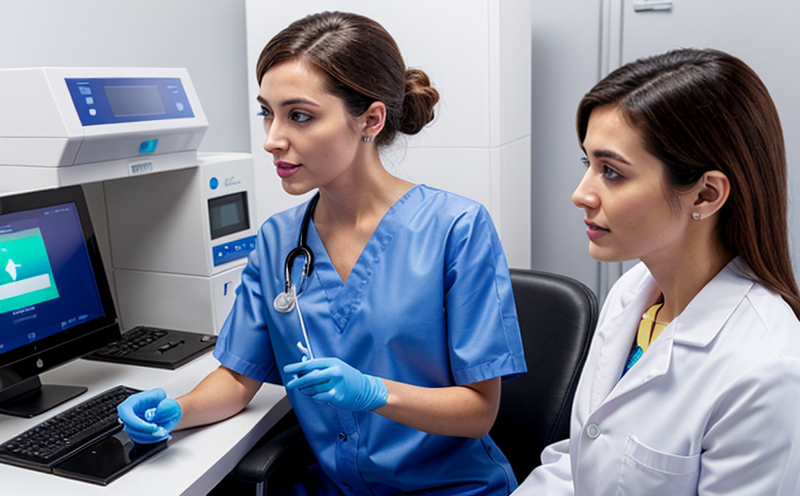PCR Testing for Avian Influenza Virus in Poultry Farms
The poultry industry plays a crucial role in global food security. However, avian influenza viruses (AIVs) pose significant risks to both animal and human health. Polymerase Chain Reaction (PCR) testing is an essential tool used by laboratories to detect the presence of AIVs in poultry farms. This method allows for rapid and accurate identification of viral nucleic acids, facilitating early detection and swift action against outbreaks.
Avian influenza viruses are highly pathogenic and can cause severe respiratory distress, neurological signs, and death in birds. The ability to identify these pathogens quickly is vital for controlling the spread of infection. PCR testing provides a sensitive and specific method to differentiate between different strains of AIVs, including H5N1, H7N9, and others that are known to circulate in poultry.
In this process, samples from affected birds or their environments are collected and processed into suitable formats for analysis. Samples can include respiratory secretions, feces, blood serum, and tissue samples. These specimens are then subjected to rigorous extraction protocols aimed at isolating the viral RNA or DNA. Once isolated, the nucleic acids undergo amplification using PCR techniques, which involve primers designed specifically for AIV detection.
The PCR process involves several steps: denaturation of the double-stranded DNA, annealing of the primers to complementary sequences on the target gene, and extension by polymerase. This cycle is repeated multiple times until sufficient amounts of amplified product are produced, making it possible to visualize or quantify the presence of viral nucleic acids using gel electrophoresis or real-time PCR machines.
Real-time PCR provides quantitative data about the amount of virus present in each sample, which can help determine the severity and extent of an outbreak. This information is invaluable for guiding treatment decisions and containment strategies within affected farms. Furthermore, molecular diagnostics like PCR testing are critical tools for surveillance programs aimed at monitoring prevalence rates across different regions.
Accurate identification of AIVs through PCR testing also contributes to public health measures by preventing the spread of potentially zoonotic diseases from animals to humans. By identifying and managing outbreaks early on, governments and industries can mitigate economic losses associated with disease control efforts such as culling infected birds or implementing biosecurity protocols.
Recent advancements in next-generation sequencing technologies have further enhanced our understanding of AIVs by allowing comprehensive characterization of their genetic makeup. This knowledge is crucial for developing targeted interventions against emerging variants that may pose new threats to poultry health and human welfare alike.
Industry Applications
- Veterinary diagnostics
- Poultry farm biosecurity monitoring
- Outbreak investigation
- Epidemiological studies
- Pharmaceutical development for vaccines and treatments
- Public health surveillance
- Certification of disease-free status
Eurolab Advantages
At Eurolab, we offer comprehensive PCR testing services tailored specifically for the detection of avian influenza viruses in poultry farms. Our state-of-the-art facilities equipped with advanced instrumentation ensure accurate and reliable results every time.
We employ highly trained professionals who understand the complexities involved in collecting representative samples from various parts of a farm or flock. Our team works closely with clients to ensure that each sample is handled correctly according to best practices outlined by international standards such as ISO 17025:2017 and EN ISO/IEC 17025.
The use of validated PCR assays guarantees consistent performance across all tests conducted at our laboratory. We adhere strictly to these guidelines, ensuring that any detected cases are reported promptly while minimizing false positives or negatives. This level of accuracy is crucial for maintaining confidence among stakeholders involved in animal husbandry and food safety sectors.
Our commitment extends beyond just technical expertise; we strive to provide personalized service by offering customized solutions based on individual client needs. From initial consultation through final report generation, our goal is to support decision-making processes with clear insights into the current state of poultry health at your farm.
Why Choose This Test
Choosing PCR testing for avian influenza virus detection offers numerous benefits over other methods currently available. Firstly, it boasts high sensitivity and specificity which means fewer false negatives or positives compared to less precise approaches like serological tests or antigenic assays.
Secondly, the speed at which results are obtained allows for quicker response times when dealing with potential outbreaks. Early intervention can significantly reduce the duration of an outbreak by minimizing its spread within a farm and preventing further transmission to other locations.
Thirdly, PCR testing provides detailed information about specific viral strains present, enabling more targeted treatment plans tailored to individual situations rather than broad-spectrum treatments that might not be effective against all forms of AIVs.
Fourthly, the ability to quantify virus levels helps evaluate effectiveness of containment measures implemented after an outbreak has been identified. Regular monitoring can help identify recurring issues or persistent low-level infections that may require additional control strategies beyond those initially applied.
Finally, compliance with regulatory requirements is easier when relying on PCR testing due to its standardized protocols and documented procedures. This ensures that all necessary steps are followed consistently across multiple tests conducted over time.





